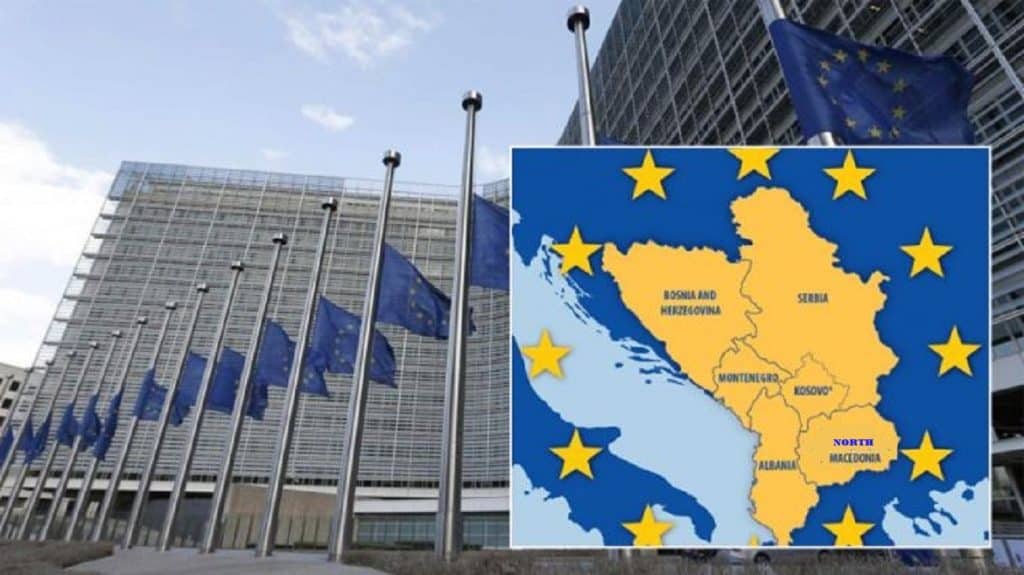World Geostrategic Insights interview with Ana Krstinovska on the issues hindering the accession of the Western Balkan countries to the European Union, the prospect of new momentum in the enlargement process, and whether China’s comprehensive infrastructure strategy in the Western Balkans undermines European integration in the region.

Ana Krstinovska, PhD, is founder and president of the North Macedonia think tank and consulting firm ESTIMA. She is also a research fellow with the Hellenic Foundation for European and Foreign Policy (ELIAMEP). Previously, she was State Secretary for European Affairs and First Secretary and Advisor for International Cooperation at the Permanent Mission to the EU of the Government of the Republic of North Macedonia.
Q1 – The Western Balkan countries-Albania, Bosnia and Herzegovina, North Macedonia, Kosovo Montenegro and Serbia-have been aspiring to join the European Union for years. However, the accession of the Western Balkan countries to the EU has stalled due to problems within the EU and the region itself. The EU seems not to have implemented a coherent and strategic policy toward the Western Balkans. Although the region has always been firmly on the Union’s agenda, it has never been a priority item. There is always another priority that has relegated the Balkans, the so-called backyard of Europe, further down the list of things to do. In your opinion, what has blocked EU enlargement in the Western Balkans?
A1 – As you rightfully point out, there are a number of internal and external issues that hinder EU enlargement in the Balkans. However, I would put more emphasis on the challenges related to the EU’s internal issues, namely the reluctance in some member states towards further enlargement and the decision-making processes which require unanimity, enabling some member states to block the process for their own, domestic policy purposes. This malfunction undermines the usual “stick and carrot” process which would allow candidate countries to make progress in the negotiation process based on their own merits and allows political elites in the Western Balkans to kick the essential reforms down the road. Simply put, most governments in the region are aware that the process will be long and will not depend (only) on them, so they are reluctant to take any actions that may be politically unpopular, failing to implement domestic reforms and creating a vicious circle between the internal and external factors influencing the enlargement process.
In some cases, the EU seems to be willing to accept and legitimize “cosmetic” reforms in order to keep the status quo, falling into the trap of “stabilitocracy” and further deterring the political elites to do what is necessary. In turn, this leads to increased disenchantment within the Western Balkan societies and is visible through significant emigration – the young, the best and the brightest in almost all professions are leaving the region in search of better life, usually in Western Europe. This leaves the Western Balkans worse off: should this vicious circle continue, the region will paint a gloomier picture by the day and will be less and less able to meet the criteria and join the EU.
Q2 – On Oct. 12, the European Commission adopted its Enlargement Package 2022, which provides a detailed assessment of the situation and progress of the Western Balkans on their pathways to the EU, with a focus on the implementation of key reforms, as well as clear guidance on future reform priorities. The Commission also recommended that Bosnia and Herzegovina be granted candidate status by the Council. EU High Representative for Foreign Affairs and Security Policy/Vice-President of the European Commission Josep Borrell said that “we are infusing a positive dynamic into the process,” stressing, against the backdrop of the war in Ukraine, the importance of an “EU enlargement, which takes on new geopolitical significance. It is a long-term investment for the peace, prosperity and stability of our continent.” Do you think the process of EU enlargement to the Western Balkans can really gain new momentum?
A2 – That would only depend on the member states. Providing Ukraine, Moldova and Georgia with a European perspective as an immediate reaction to the Russian aggression was certainly the right thing to do, but it shed light on the limbo in which the Western Balkan region finds itself for years. While the war in Ukraine may prove to be pivotal to accelerate the whole process and lead towards another political (big bang enlargement) as the one in 2004 and 2007, there are no political signs that this is likely to happen. Instead, we see the contours of a “European Political Community”, intended as a consolation prize especially for the frontrunners and veterans in the enlargement process, namely Montenegro, Serbia and North Macedonia. While the benefits of such a union, if properly devised, are not to be underestimated, it will still mean that the EU has fallen short of its promise to provide a tangible accession perspective and lead to further disappointment in the Western Balkans.
In order to avoid such a scenario, the EU should carefully feel the pulse in the region and not overestimate the satisfaction in these countries of being merely seated at the same table with the EU counterparts once a year in a vague political summit. Undoubtedly, NATO with its presence in three of the six Western Balkan countries has the ability to keep the situation in check in terms of providing a Western perspective and security guarantee, but it cannot replace the EU’s mechanisms to promote sustainable and efficient reforms and to encourage prosperity and development. Nor can it close the gap in the three countries which are not likely to join NATO (any time soon or ever), leaving the region overall vulnerable to foreign influences.
The EU has never fared well in times of crises, but this is high time for its member states to learn a lesson and be proactive. Only substantial progress in the accession process visible at annual level through the European Commission reports and Council conclusions, teamed with tangible domestic reforms that will be actually felt by the Western Balkan citizens has the potential to deliver the much needed results and cement EU’s presence and influence in the region.
Q3 – A bridge in Croatia, a high-speed train in Serbia, and a highway in Montenegro: three major infrastructure projects implemented by China in the Balkans and inaugurated in 2022. Over the past decade, China has increased investment in the Western Balkans and cooperation with these countries through the China-ECE program and the BRI. Except for Kosovo, which China does not recognize as a country, all Western Balkan countries have negotiated agreements for infrastructure projects with China. However, China’s infrastructure projects in the Western Balkans are a potential cause for concern for the EU. In your opinion, could China’s global infrastructure strategy undermine European integration in the Western Balkans? Or is China’s concerted effort to invest heavily in infrastructure in these countries unrelated to the EU enlargement process?
A3 China has never voiced discontent from the Western Balkans’ EU accession perspective; to the contrary, it has always voiced support for this process. This is mostly due to the fact that if these countries join the EU while maintaining good relations with China, China will have one more friend at the EU table when decisions are being made. In addition, in terms of economic gains, Chinese companies active in these countries will reap the benefits of joining the EU single market, greater stability, simplified procedures and unified rules and standards. At the same time, as the milestone of joining the EU is still far away and China knows it, it seeks to maximize its own benefits in the short and long term.
In the short to mid-term, the main criticism is based on the fact that the infrastructure projects implemented with Chinese funds and/or partners are not implemented according to EU – and national, Western Balkan standards, but follow Chinese governance practices. They are all marred with low transparency and accountability, low sustainability and cost-benefit issues, poor project planning and preparation, opaque tendering and contracting procedures, implementation deficiencies – all leading to suboptimal outcomes, excessive delays and cost overruns which are ultimately born by the Western Balkan taxpayers.
In the long term, China aims to expand its global presence, inter alia by promoting the BRI in this part of the world, opening market opportunities for its companies and creating ever-stronger ties which at times could be interpreted as dependencies. This is particularly relevant for the loan contracts as a mechanism to fund infrastructure projects which are largely asymmetrical and put the recipient countries in a subordinate position. Namely, China has the right to terminate these contracts for political or diplomatic reasons and ask for immediate repayment of the loans, which due to their size, could drive smaller countries into default. This is further enhanced by the fact that the agreements are concluded under Chinese law and any dispute should be resolved in front of an arbitration commission in Beijing, which means that China has at its disposal a powerful tool for economic coercion that it could use at some point if these countries become overtly hostile towards China and its interests.
Ana Krstinovska, PhD – Founder and president of the North Macedonia think tank and consulting firm ESTIMA. She is also a research fellow with the Hellenic Foundation for European and Foreign Policy (ELIAMEP). Previously, she was State Secretary for European Affairs and First Secretary and Advisor for International Cooperation at the Permanent Mission to the EU of the Government of the Republic of North Macedonia.







